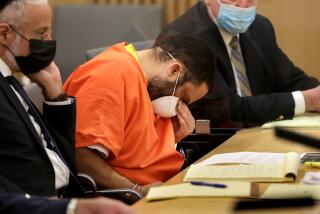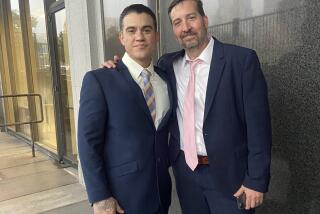Acquittal in Abuse Case Tied to Killing
- Share via
A Long Beach man, convicted in April of child abuse in connection with the killing of a 3-year-old girl, was acquitted of assault charges in Los Angeles Superior Court Wednesday.
After three days of deliberations, jurors found Randy Lonell Foster, 24, not guilty of administering severe discipline on his girlfriend’s daughter, Milan Anjonet Scott, causing the girl’s death in 1999.
Milan’s body was cut into seven pieces, then hidden in concrete and placed in the trunk of Foster’s car, according to testimony.
As the verdict was read, Foster cried and slumped in his chair. He remains in custody because of the previous conviction. He was acquitted of murder in April.
Judge Michael E. Pastor set sentencing on the child abuse conviction for Feb. 6. Foster faces a maximum of 10 years in state prison.
“Mr. Foster is still very emotional and upset about the death of Milan,” said his lawyer, Public Defender Thomas Moore.
Deputy Dist. Atty. Victor Rodriguez had argued that Foster administered severe discipline on the girl, which led to her death.
Foster and his girlfriend, Rakeisha Lanette Scott, 24, told police that Milan went to bed dizzy one night after falling down in the bathroom. When they woke the next morning, she was dead, they said.
Out of fear of losing custody of the couple’s infant son, Foster panicked and hid Milan’s body, Moore said during the trial.
The body was found by Los Angeles County sheriff’s deputies June 27, 2000, after Foster’s father, William Foster, told police he had learned from his son that Milan’s body was in the trunk of a car in the backyard of his Willowbrook home.
Scott was convicted in April of murdering the girl. She was also found guilty of assault on a child under age 8 and child endangerment. Scott was sentenced Monday to 25 years to life in state prison.
Her sentencing had been postponed pending her possible testimony in Foster’s retrial. But she decided not to testify, Rodriguez said.
“I’m disappointed with the verdict,” Rodriguez said. “Even though it was a difficult case, I still believe we had sufficient evidence to obtain a conviction.
“There was evidence of conscience of guilt, the dismemberment, because he certainly went through a lot of trouble to get rid of the body.”
More to Read
Sign up for Essential California
The most important California stories and recommendations in your inbox every morning.
You may occasionally receive promotional content from the Los Angeles Times.










